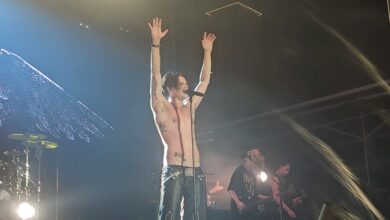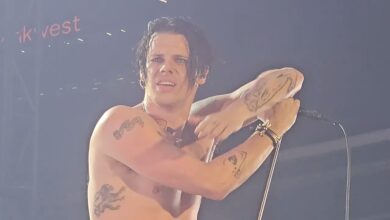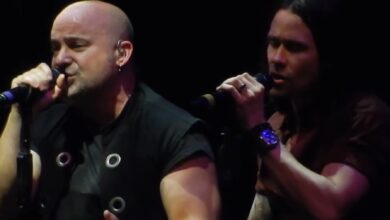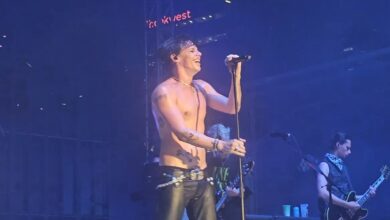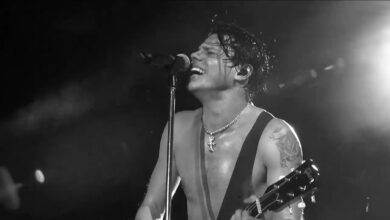Brian, 70, stands alone with his guitar and electrifies the stadium
Queen and Jessie J’s performance at the 2012 Olympic Closing Ceremony was an unexpected yet electrifying collaboration that perfectly blended rock royalty with modern pop power. The audience at the Olympic Stadium in London, as well as millions watching around the world, were treated to a spectacle that celebrated not only the spirit of the Olympics but also the rich legacy of British music. Queen’s Brian May and Roger Taylor took the stage to play some of the band’s greatest hits, and as the iconic riffs of “We Will Rock You” began, Jessie J made her entrance, turning heads with her commanding stage presence.
Freddie Mercury’s presence was also felt through the use of a hologram, warming up the crowd before Jessie J came in to deliver her own interpretation of the anthem. Her ability to take on a song made famous by one of rock’s greatest frontmen was no easy task, yet she did so with confidence, adding powerful vocal runs and ad-libs that put her unique stamp on the performance. Brian May’s masterful guitar solo echoed through the stadium, adding a timeless feel to the evening’s festivities. Roger Taylor’s drumming brought an undeniable energy that reverberated through the Olympic grounds.
At 70 years old, May proved that age was no barrier to delivering an unforgettable performance, showcasing his guitar prowess with an intensity that captivated fans of all ages. The chemistry between Queen and Jessie J was remarkable, despite their seemingly contrasting musical styles. The fusion of classic rock with Jessie J’s dynamic pop vocals worked seamlessly, creating a powerful and exhilarating moment that resonated with the audience.
The Olympic Closing Ceremony itself was a celebration of British music, featuring other major acts such as Annie Lennox, Pet Shop Boys, and Spice Girls. However, Queen and Jessie J’s performance stood out as one of the evening’s highlights. It was not just a tribute to Queen’s legacy but a reminder of their enduring influence on contemporary music. Jessie J’s performance added a fresh twist, and her ability to step into such an iconic song without overshadowing its history was widely praised by both fans and critics.
The combination of May’s blistering guitar solos and Jessie J’s energetic performance of “We Will Rock You” left a lasting impression. Viewers remarked how the collaboration proved that sometimes the most unexpected pairings can deliver the most memorable moments. Jessie J, who had already made a name for herself with hits like “Price Tag,” gained even more respect from fans of classic rock, with many applauding her versatility as an artist.
Brian May later reflected on the performance, expressing his admiration for Jessie J’s talent and how smoothly she integrated with Queen’s style. Jessie J herself has mentioned how surreal the experience was, performing alongside legends she had admired for years. It was a career-defining moment for her, showing that she could hold her own with the biggest names in the industry. The mutual respect between the artists was evident, creating an atmosphere of genuine collaboration and artistic synergy.
Behind the scenes, the collaboration was a product of meticulous planning and shared vision. Both Queen and Jessie J’s teams worked closely to ensure that the performance honored the legacy of Queen while allowing Jessie J to bring her unique flair to the stage. The integration of advanced holographic technology to feature Freddie Mercury was a nod to Queen’s innovative spirit, bridging the past with the present in a seamless manner. The technical prowess required to synchronize live performances with holographic projections was a testament to the dedication of everyone involved.
The stage design for the performance was equally impressive, featuring a blend of classic and contemporary elements that highlighted the strengths of both Queen and Jessie J. The lighting was carefully orchestrated to complement the powerful guitar riffs and Jessie J’s dynamic vocals, creating a visually stunning experience that matched the auditory spectacle. The use of pyrotechnics and synchronized lighting effects added to the grandeur, making the performance not just a musical event but a visual masterpiece as well.
Audience reactions were overwhelmingly positive, with fans expressing their delight on social media platforms and in personal testimonies. Many highlighted the emotional impact of seeing Queen’s timeless music reimagined by a new generation of artists. The performance became a topic of conversation long after the ceremony concluded, with discussions about the potential for future collaborations between classic rock legends and contemporary pop stars. It sparked a renewed interest in Queen’s music among younger listeners, bridging generational gaps through the universal language of music.
In the years that followed, Queen continued to tour with Adam Lambert as their lead vocalist, but the Olympic performance with Jessie J remains a standout moment. It bridged generations of music lovers and reinforced Queen’s position as one of the greatest rock bands in history, while Jessie J’s powerful performance demonstrated her range as an artist who can transcend genres. The legacy of that night lives on, inspiring artists to explore cross-genre collaborations and pushing the boundaries of live performances.
Ultimately, the 2012 Olympic Closing Ceremony wasn’t just about the conclusion of the games—it was a tribute to the enduring power of music, and Queen’s collaboration with Jessie J perfectly encapsulated that spirit. The performance was a nod to the past, present, and future of British music, uniting audiences across the world in celebration. It showcased how music can evolve while still honoring its roots, creating moments that are both nostalgic and forward-looking. This harmonious blend of different musical eras and styles highlighted the universal appeal of music, making the Olympic Closing Ceremony a truly memorable event for all who experienced it.

